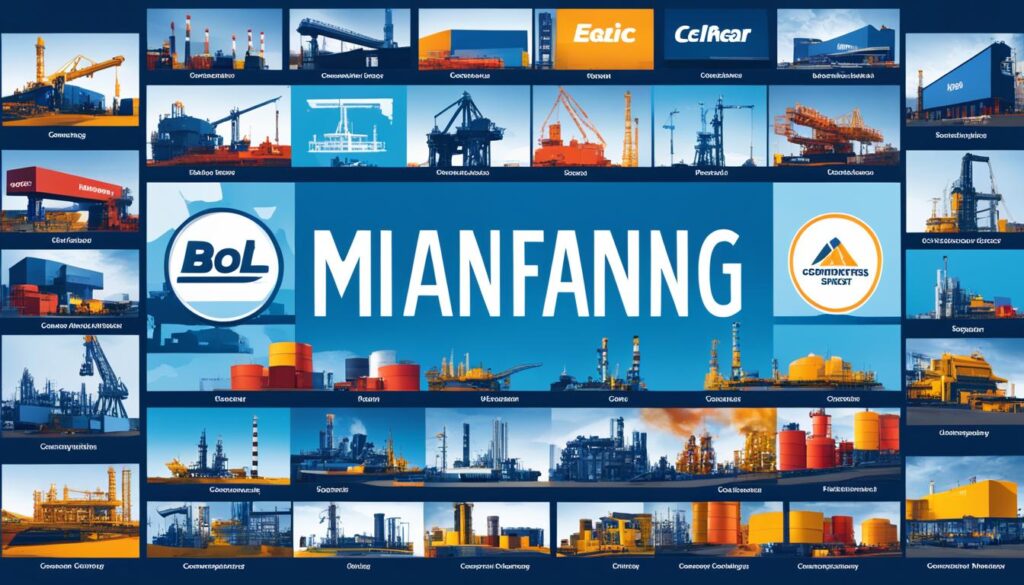Basic industries are vital to the global economy. These companies extract, process, and manufacture raw materials and essential commodities. They impact the availability and cost of goods across various sectors.
The field includes mining, energy production, chemical manufacturing, and materials science. Leading firms in these areas shape the industry landscape. Their influence extends far beyond their immediate operations.
Key Takeaways
- The basic industries field encompasses a wide range of companies involved in the extraction, processing, and manufacturing of essential raw materials and commodities.
- These companies play a crucial role in the global economy, impacting the availability and cost of goods and services across various industries.
- The leading firms in the basic industries sector include major players in mining, energy production, chemical manufacturing, and materials science.
- Understanding the top companies in the basic industries field is important for evaluating the sector’s overall performance and potential.
- The basic industries sector is a key driver of economic growth and development, making it a significant area of focus for investors and policymakers.
Introduction to Basic Industries
Basic industries form the backbone of the global economy. They provide essential raw materials, energy sources, and building blocks for various industries. This sector includes companies that extract, process, and produce commodities like oil, gas, metals, minerals, and chemicals.
Understanding basic industries is crucial for analyzing the economic landscape. It helps identify major companies driving growth and innovation in this field.
Understanding the Sector
The basic industries sector is split into several key segments. These include energy, mining, mineral extraction, chemical production, and primary metal manufacturing. Companies in this field usually operate in one or more of these areas.
They use their expertise to supply essential raw materials to various industries. These materials are vital for downstream production processes.
Importance in the Global Economy
Basic industries are vital to the global economy. They provide raw materials and energy sources for manufacturing, construction, and transportation. Their products are deeply integrated into the global supply chain.
These industries drive economic growth and development worldwide. They enable progress and innovation across various sectors.
“The basic industries sector is the backbone of the global economy, supplying the essential resources and materials that enable progress and innovation across industries.”
| Segment | Key Companies | Market Share |
|---|---|---|
| Energy | ExxonMobil, Chevron, BP, Royal Dutch Shell | 60% |
| Mining | BHP, Rio Tinto, Vale, Glencore | 55% |
| Chemicals | BASF, Dow, DuPont, LyondellBasell | 45% |
| Primary Metals | ArcelorMittal, Nucor, U.S. Steel, Alcoa | 50% |
Major Players in Basic Industries
The basic industries sector boasts several leading corporations. These top basic industries players use their vast resources and tech know-how to stay ahead. They shape the industry’s direction with their global reach and strong market presence.
Energy giants like Exxon Mobil, Chevron, and BP lead the pack. In mining, BHP, Rio Tinto, and Vale shine as leading basic industry corporations. They use cutting-edge mining tech and run huge global operations.
| Company | Sector | Market Capitalization (USD) |
|---|---|---|
| Exxon Mobil | Energy | $211 billion |
| Chevron | Energy | $186 billion |
| BP | Energy | $85 billion |
| BHP | Mining | $125 billion |
| Rio Tinto | Mining | $92 billion |
| Vale | Mining | $65 billion |
These leading basic industry corporations excel in a complex sector. They use their size, know-how, and tech skills to stay on top. Their success proves they can handle the industry’s challenges with ease.
Leading Basic Industries Companies by Segment
The basic industries sector boasts several dominant players in various segments. These powerhouses shape industry trends and dynamics. Their influence extends across the entire sector landscape.
Energy Sector Giants
Energy is a crucial part of basic industries. Key basic industries manufacturers like Exxon Mobil, Chevron, and BP lead the pack. These significant basic industry organizations use their resources and expertise to innovate and dominate markets.
Prominent Mining Corporations
Mining forms another vital pillar of basic industries. Notable basic industries enterprises specialize in extracting and processing diverse metals and minerals. BHP, Rio Tinto, and Glencore stand as industry titans.
These companies use robust operations and global reach to meet raw material demands. Their influence spans across continents and industries.
| Company | Segment | Revenue (USD Billion) | Market Share (%) |
|---|---|---|---|
| Exxon Mobil | Energy | 264.9 | 5.2% |
| Chevron | Energy | 162.5 | 3.2% |
| BP | Energy | 164.2 | 3.3% |
| BHP | Mining | 59.5 | 1.2% |
| Rio Tinto | Mining | 55.6 | 1.1% |
| Glencore | Mining | 221.1 | 4.3% |
Key basic industries manufacturers have established strong market positions. They leverage operational efficiency and technological advancements to maintain their status. These notable basic industries enterprises continue to shape the basic industries landscape.

what companies are in the basic industries field
The basic industries field includes companies producing and distributing essential raw materials and commodities. These firms supply inputs for manufacturing, construction, transportation, and consumer goods industries. Key players come from energy, mining, chemicals, and materials science sectors.
Energy giants like ExxonMobil, Chevron, and BP dominate the basic industries field. They explore, extract, and refine fossil fuels that power the global economy.
Mining is another crucial component, led by companies such as BHP, Rio Tinto, and Vale. They extract and process valuable minerals and metals. These resources are essential for making various products, from buildings to electronics.
| Company | Sector | Market Capitalization |
|---|---|---|
| ExxonMobil | Energy | $228 billion |
| BHP | Mining | $155 billion |
| Dow Inc. | Chemicals | $41 billion |
These companies represent a fraction of the basic industries field. By providing raw materials and commodities, they shape our world. Their work is vital to powering the global economy.
Financial Performance and Market Share
Basic industries’ financial performance and market share are vital indicators of sector health. Analyzing revenue, profitability, and market dominance reveals insights into growth potential and competitive dynamics. This analysis also shows the impact of commodity prices, regulations, and technological advancements.
Revenue and Profit Analysis
Leading basic industry corporations’ financial statements show diverse performance outcomes. Some companies maintain impressive revenue growth and healthy profit margins. Others face volatility and challenges in navigating industry complexities.
| Company | Revenue (in billions) | Profit Margin (%) |
|---|---|---|
| ExxonMobil | $259.5 | 7.9% |
| Chevron | $142.7 | 9.2% |
| BHP | $60.8 | 31.5% |
| Rio Tinto | $44.6 | 28.7% |
This data highlights significant variations in financial performance among leading basic industries companies. It emphasizes the need for strategic decision-making and adaptability in an ever-changing market landscape.
“The ability to navigate the complexities of the basic industries sector, while maintaining a strong financial footing, is a true testament to the resilience and strategic prowess of these major basic industries firms.”
Sustainability and Environmental Impact
Leading basic industries companies are focusing on sustainability and eco-friendly practices. They aim to reduce their carbon footprint and promote environmental responsibility. This shift is reshaping the industry landscape.
Many firms are investing in renewable energy sources like solar and wind power. This helps them cut down on fossil fuel use and lower greenhouse gas emissions. They’re also improving production processes and optimizing resource use.
Companies are developing innovative, eco-friendly products and services. These efforts are crucial for long-term success and social acceptance. As public scrutiny and regulatory pressure increase, the top basic industries players must demonstrate their commitment to sustainable practices to maintain their position in the market and appeal to socially conscious consumers.
| Sustainability Initiatives | Impact |
|---|---|
| Renewable Energy Investment | Reduced carbon footprint and reliance on fossil fuels |
| Efficient Production Processes | Optimized resource utilization and waste reduction |
| Eco-friendly Product Development | Improved environmental impact and market appeal |
By adopting sustainable practices, prominent basic industries businesses are creating a greener future. They’re also setting themselves up for success in an eco-conscious market.

“Sustainability is no longer a choice, but a necessity for companies in the basic industries sector to remain competitive and relevant in the global market.”
Technological Advancements and Innovations
Basic industries are changing fast with new tech and Industry 4.0 principles. Companies use digital solutions to improve operations and create innovative products. These changes help meet the global market’s evolving needs.
Digitalization and Industry 4.0
Big basic industry firms now use data analytics, automation, and AI. These tools help them make better choices and boost efficiency. They also stay competitive in a tough market.
Mining companies use algorithms to predict equipment failures. This cuts downtime and maintenance costs. Energy giants use smart grids to improve energy distribution and use.
“The integration of digital technologies is redefining the future of basic industries, empowering companies to become more agile, innovative, and responsive to the needs of the market.”
The basic industries sector keeps changing with Industry 4.0 principles. Companies that invest in new tech will do well. Those that encourage innovation will thrive in the future.
Investment Prospects and Growth Opportunities
The basic industries sector offers promising investment prospects and growth opportunities. Global demand for essential raw materials is rising. Sustainable energy solutions and technological disruption create a favorable environment for strategic investments.
Investors and companies in basic industries can capitalize on several emerging trends:
- The growing need for renewable energy sources is driving investments in clean energy infrastructure and technologies, such as solar, wind, and energy storage solutions.
- The push for sustainable development and the circular economy is creating opportunities in recycling, waste management, and the development of eco-friendly materials and processes.
- Advancements in digital technologies, such as automation, data analytics, and artificial intelligence, are transforming operational efficiency and decision-making across basic industries.
Understanding the industry’s investment landscape is crucial for identifying growth opportunities. This knowledge helps companies create long-term value in the sector.
| Segment | Growth Potential | Key Drivers |
|---|---|---|
| Energy | Significant | Renewable energy adoption, grid modernization, energy storage |
| Mining | Moderate | Demand for critical minerals, sustainable mining practices |
| Chemicals | Steady | Petrochemical demand, specialty chemicals, sustainability |
Companies can enhance their competitiveness by positioning themselves to capitalize on these growth opportunities. This strategy drives long-term value creation in the dynamic basic industries sector.
Conclusion
The basic industries field is crucial to the global economy. It includes energy, mining, and chemical corporations. These companies shape the availability and pricing of essential raw materials worldwide.
The sector faces technological advancements and environmental challenges. Understanding key players and their performance provides valuable insights. This knowledge benefits investors, policymakers, and industry stakeholders.
The industry’s landscape is dynamic and ever-changing. Staying informed is crucial for adapting to new trends. Top firms drive innovation and growth in this sector.
Basic industries remain vital to the global economic framework. Leading corporations push for sustainability and progress. Their efforts shape the future of this essential field.